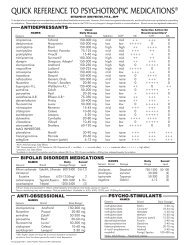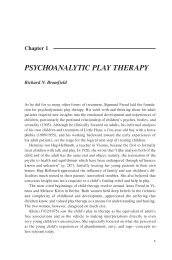IRAQ WAR CLINICIAN GUIDE
Iraq War Clinician's Guide - Network Of Care
Iraq War Clinician's Guide - Network Of Care
You also want an ePaper? Increase the reach of your titles
YUMPU automatically turns print PDFs into web optimized ePapers that Google loves.
Iraq War Clinician Guide 64 Caring for the Clinicians<br />
and with that came greater mastery to meet this clinical challenge. As time passed fewer nurses<br />
attended these support sessions, suggesting greater self-sufficiency and confidence.<br />
Another perceived helpful recommendation to the nursing staff was to suggest that they leave their<br />
assigned clinical environments to see the progress patients were making further into recovery.<br />
Nurses were encouraged to visit during patient physical therapy (learning to walk with a prosthetic<br />
limb) or occupational therapy (shaving for the first time with a prosthetic arm) sessions. These visits<br />
permitted the nursing staff (especially operating room and intensive care units nurses) to see that<br />
patients wcrc getting better and more capable despite the staff's initial less hopeful perceptions.<br />
Other staff members would likely benefit from a similar approach.<br />
The recent influx of critically injured young men and women with amputations from lraq has<br />
posed a new and unusual challenge to the medical treatment teams. The staff has had to rapidly<br />
assimilate new knowledge in providing clinical treatment to this population, as well as appreciate<br />
and deal with the emotional impact of the loss of a limb on a service member. The patient or<br />
hislher family member often go through stages of grieving that can understandably result in anger<br />
or resentment regarding the injury. Not infrequently, staff members bear the brunt of this ill feeling.<br />
Often, discussion of the dynamics of patient and family member's responses can be extremely<br />
helpful to members of the treatment team in order to put unpleasant interactions into perspective<br />
and maintain an empathic stance toward the patient.<br />
Frequently, patients, family members, or staff members benefit from a discussion of their emotional<br />
responses to the traumatic event or the resulting treatments. This might occur in either individual<br />
or small group settings. As embedded members of the trauma team, PCLS clinicians facilitate<br />
patient and staff acceptance of interventions without the fear their responses or "symptoms" are<br />
going to be labeled as pathological. Offerings of support, encouragement and normalization of<br />
response are necessary and experienced as helpful. Encouragement of appropriate laughter, use of<br />
relaxation techniques for staff and patients alike, building of esprit de corps, and the opportuniv to<br />
share food all help. Most important is communicating respect and genuine concern for each other.<br />
Physicians, particularly surgeons, work extended hours. Their unique burden is best exemplified in<br />
the words of one WRAMC physician: "How difficult it was for me when I needed to cut off the<br />
legs of that young boy." Psychiatrists and other mental health clinicians work side-by-side with the<br />
surgeons as part of the trauma team. Similar to nursing, physician staff support groups were<br />
established at the onset of the Operation Iraqi Freedom. These groups were usually scheduled<br />
prior to their respective clinical rounds. Psychoeducational approaches have also been useful.<br />
PCLS members have presented at surgical department Grand Rounds or staff forums on topics<br />
related to stress, burnout and the management of difficult patients. By encouraging availability<br />
through informal curb siding, frequent phone calls and spontaneous as-needed appointments has<br />
improved perceived availability and interest on the part of PCLS staff members. Of course, e-mail<br />
similarly supports such communication and also has the benefit of making additional resources<br />
quickly available to hospital staff through attached document files or hyperlinks to useful websites.<br />
Conclusions<br />
Hospital clinicians treating trauma patients are at risk for emotional reactions that, if left<br />
unattended, can lead to psychological stress, burnout, and reduction in clinical efficiency and<br />
effectiveness. The Walter Reed PCLS service recommends a combination of approaches that serve<br />
PP.<br />
DEPARTMENT OF VETERANS AFFAIRS<br />
NATIONAL CENTER FOR PTSD




